
REVISTA DE LA SOCIEDAD GEOLOGICA DE ESPANA
Scope & Guideline
Illuminating Geological Processes for a Sustainable Future
Introduction
Aims and Scopes
- Geological Heritage and Education:
The journal highlights the significance of geological heritage, promoting studies that examine geological sites and their educational value. This includes methodologies for geological site assessments and the development of educational initiatives to raise awareness about geology. - Environmental Geology and Sustainability:
Research related to environmental impacts, such as the presence of microplastics and their effects on soil and groundwater, is a core focus. The journal emphasizes studies that analyze the interaction between geological processes and environmental sustainability. - Applied Geology and Resource Management:
The journal covers applied geological studies, including the assessment of natural resources like lithium and potassium brine deposits, and the evaluation of geological sites for sustainable socioeconomic development. - Historical and Biographical Perspectives in Geology:
The journal includes historical analyses and biographical studies of prominent figures in geology, highlighting their contributions and the evolution of geological sciences over time. - Geological Mapping and Remote Sensing:
Utilizing modern technologies such as remote sensing, the journal emphasizes the importance of geological mapping in understanding geological structures and phenomena.
Trending and Emerging
- Climate Change and Geological Impacts:
Recent publications have increasingly focused on the geological implications of climate change, including studies on geological formations and processes affected by climatic shifts, emphasizing the urgent need for geological insights in climate discussions. - Microplastics and Environmental Geology:
There is a rising trend in research examining the impact of microplastics on geological environments, particularly in soil and groundwater, highlighting the intersection of geology, ecology, and public health. - Sustainable Resource Management:
The journal has seen an increase in studies related to the sustainable management of geological resources, such as the exploration of lithium deposits, reflecting a growing concern for resource sustainability and environmental stewardship. - Historical Contexts in Geology:
Emerging interest in the historical contexts of geological discoveries and the biographies of significant figures in geology suggests a trend towards integrating history with contemporary geological research. - Innovative Educational Approaches in Geology:
There is a noticeable trend towards innovative educational methodologies in geology, such as the implementation of escape rooms for teaching paleontology, which indicates a growing emphasis on engaging educational practices.
Declining or Waning
- Paleontology and Fossil Studies:
While paleontological contributions were previously more prominent, there has been a decline in studies focusing on fossils and their implications for understanding geological history, suggesting a shift towards more contemporary geological issues. - Traditional Structural Geology:
Research centered on traditional structural geology concepts and methodologies appears to be waning, as newer studies focus on interdisciplinary approaches that integrate geological data with environmental and societal concerns. - Regional Geological Studies:
There seems to be a decrease in region-specific geological studies, particularly those that do not incorporate broader environmental or socioeconomic contexts, indicating a trend towards more global or comparative studies.
Similar Journals
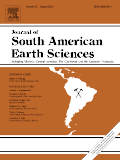
JOURNAL OF SOUTH AMERICAN EARTH SCIENCES
Unlocking the Mysteries of South America's Geological HeritageJOURNAL OF SOUTH AMERICAN EARTH SCIENCES is a premier interdisciplinary journal dedicated to publishing high-quality research in the fields of Earth-Surface Processes, Geology, and Paleontology, making it an essential resource for scientists and researchers focused on South American geology and its diverse geological phenomena. Published by Pergamon-Elsevier Science Ltd in the United Kingdom, this journal has been instrumental in disseminating groundbreaking studies since 1988, showcasing contributions that push the boundaries of knowledge in Earth and Planetary Sciences. With an impressive Scopus ranking—positioning it in the 74th percentile for Paleontology and 71st for Geology—this journal not only reflects robust academic quality but also its commitment to addressing critical geological challenges in South America. Researchers will appreciate its objective of advancing understanding of geological processes while providing insights into past, present, and future Earth environments. Although available through traditional subscription models, the journal's vast repository of articles enriches the academic landscape, facilitating the sharing of vital research among professionals, students, and geological practitioners.
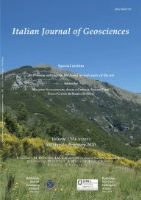
Italian Journal of Geosciences
Unlocking Planetary Insights: Where Earth Meets ResearchItalian Journal of Geosciences, published by the Società Geologica Italiana, is a distinguished platform for the dissemination of research in the fields of Earth and Planetary Sciences and Geology. With an impressive impact factor reflected in its 2023 rankings, where it placed in the Q3 category across its related fields, this journal serves as a vital resource for academics, practitioners, and students. Established in 2010 and poised to continue until 2024, the journal showcases critical advancements and interdisciplinary studies that deepen our understanding of geological processes and Earth systems. Operating under open access options, it offers robust accessibility to a broad audience, facilitating wider dissemination of knowledge. The journal's affiliation with Università degli Studi La Sapienza in Rome, Italy, further underscores its commitment to academic excellence and innovation in geosciences.
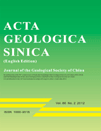
ACTA GEOLOGICA SINICA-ENGLISH EDITION
Connecting Scholars to the Heart of Earth SciencesACTA GEOLOGICA SINICA-ENGLISH EDITION is a distinguished academic journal published by Wiley, providing a platform for cutting-edge research in the field of geology. With an ISSN of 1000-9515 and E-ISSN 1755-6724, this journal has been a pivotal resource since its inception in 1988, catering to scholars and professionals until 2024. The journal is recognized for its high-quality articles, achieving a Q2 ranking in the field of Geology according to the 2023 category quartiles, and ranks #122 out of 321 in the Scopus Earth and Planetary Sciences sector, placing it within the 62nd percentile among its peers. Although currently not available as an open access publication, it remains a significant repository of knowledge that supports ongoing geological research and exploration. For researchers, students, and professionals looking to deepen their understanding of geological sciences, ACTA GEOLOGICA SINICA-ENGLISH EDITION stands as an essential journal, promoting collaboration and innovation in the earth sciences.

Austrian Journal of Earth Sciences
Connecting Scholars in Earth SciencesThe Austrian Journal of Earth Sciences, published by SCIENDO, is an esteemed open-access journal specializing in the disciplines of geology, paleontology, and stratigraphy. With an ISSN of 2072-7151, this journal has established itself as a significant platform for innovative research and scholarly communication in the earth sciences. Since its inception in 2007, it has continuously expanded its influence, achieving notable rankings in the Scopus database—#113 in Geology, #42 in Paleontology, and #21 in Stratigraphy, demonstrating its commitment to high-quality publications. The journal holds prestigious quartile rankings of Q1 in both Geology and Paleontology and Q2 in Stratigraphy as of 2023, reflecting its impact and relevance in the scientific community. Researchers and students alike are encouraged to explore and contribute to the evolving discourse within this dynamic field, as the Austrian Journal of Earth Sciences fosters collaboration and knowledge sharing across global platforms.

Journal of Geosciences
Advancing Earth Sciences through Innovative ResearchJournal of Geosciences is a distinguished peer-reviewed journal published by CESKA GEOLOGICKA SPOLECNOST, based in the Czech Republic, that serves as a vital platform for the dissemination of innovative research in the field of Earth and Planetary Sciences. With an ISSN of 1802-6222 and E-ISSN of 1803-1943, this journal has established its significance within the academic community, evidenced by its Q3 ranking in both Earth and Planetary Sciences and Geology. The journal covers a broad array of topics, making it an essential resource for researchers, professionals, and students interested in geoscientific advancements and discoveries. The Journal of Geosciences reflects a commitment to high-quality scholarship, embracing a variety of methodologies and interdisciplinary approaches, and provides open access to its content, thereby encouraging global collaboration and knowledge sharing among geoscientists. With a publication history converging from 2007 to 2024, it continues to be a prominent venue for critical conversations and developments in the ever-evolving field of geosciences.

Frontiers of Earth Science
Transforming Understanding of Planetary ProcessesFrontiers of Earth Science is a prominent academic journal in the field of Earth and Planetary Sciences, published by Springer. With an ISSN of 2095-0195 and an E-ISSN of 2095-0209, this journal serves as a significant platform for researchers and professionals to disseminate their findings from 2007 to 2024. It is recognized for its impactful contributions within the category of Earth and Planetary Sciences, boasting a respected Q2 ranking in 2023. With a Scopus ranking of 64 out of 195, placing it in the 67th percentile, Frontiers of Earth Science continues to drive academic dialogue and innovation. The journal is dedicated to exploring a diverse range of topics, including geology, meteorology, and environmental science, and amplifying the understanding of Earth systems through rigorous research. Located in New York, USA, this journal embraces an Open Access model, ensuring that groundbreaking research is readily available to the global scientific community, thereby enhancing its accessibility and impact.
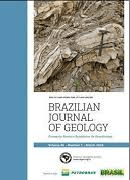
Brazilian Journal of Geology
Empowering Global Geoscientific CollaborationBrazilian Journal of Geology, the flagship publication of the SOC BRASILEIRA GEOLOGIA, has been a beacon of geoscientific research since its inception in 2013. With an ISSN of 2317-4889 and an E-ISSN of 2317-4692, this open-access journal has facilitated the dissemination of high-quality research across various branches of geosciences, making it freely accessible to a global audience since 2014. Hailing from Brazil, the journal proudly holds a Q2 ranking in Earth and Planetary Sciences as of 2023, and ranks #73 out of 195 in Scopus, indicating its growing impact and relevance in the field. The Brazilian Journal of Geology aims to bridge diverse geological studies with interdisciplinary approaches, promoting the understanding and application of geology in addressing contemporary scientific challenges. As it converges research from 2013 to 2024, the journal not only enriches the academic landscape but also serves as a vital resource for researchers, professionals, and students eager to explore the complexities of the Earth and its processes.
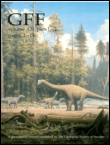
GFF
Innovative Discoveries in Geology and Paleontology Await.GFF is a prestigious academic journal dedicated to advancing research in the fields of Geology and Paleontology. Published by Taylor & Francis Ltd in the United Kingdom, GFF serves as a vital platform for disseminating innovative findings and fostering discussions among researchers, professionals, and students alike. With a noteworthy impact factor reflecting its significance in the scientific community, GFF has achieved Q2 ranking in both Geology and Paleontology, underscoring its commitment to high-quality scholarship. The journal has been operational since 1872, accumulating a rich history of contributing to our understanding of earth sciences. It currently ranks #133 out of 321 in Earth and Planetary Sciences - Geology, and #50 out of 113 in Paleontology according to Scopus rankings. Although it does not offer an open access option, GFF remains accessible through various academic databases, ensuring that cutting-edge research reaches a wide audience. Its comprehensive scope aims to explore critical advancements in geological and paleontological sciences, making it an essential resource for those committed to exploring the intricacies of our planet’s past and present.

Bulletin of the Mineral Research and Exploration
Unlocking Earth’s Secrets Through Open Access ResearchBulletin of the Mineral Research and Exploration, published by MADEN TETKIK VE ARAMA GENEL MUDURLUGU-MTA in Turkey, is a prominent open-access journal that has been disseminating vital research in the fields of geology and geotechnical engineering since 1936. With an ISSN of 0026-4563 and a commitment to sharing knowledge without barriers, this journal fosters an inclusive environment for researchers, professionals, and students alike. The journal is recognized for its contribution to the scientific community, illustrated by its Q3 ranking in Geology and Q4 ranking in Geotechnical Engineering and Engineering Geology for the year 2023. Despite its solid performance, the journal remains dedicated to improving its Scopus rankings, currently positioned at #230 out of 321 in Earth and Planetary Sciences for Geology, and #169 out of 229 in Geotechnical Engineering. The journal's historical convergence of years emphasizes its longstanding relevance and adaptability in disseminating cutting-edge research. By offering open access, it ensures that vital geological and engineering insights are readily available to a global audience, thereby enhancing collaboration and advancing knowledge in these crucial fields.

Andean Geology
Pioneering Research in Andean Earth SciencesAndean Geology is a prominent open-access journal, published by the SERVICIO NACIONAL GEOLOGIA MINERVA in Chile, dedicated to advancing the fields of geology, geochemistry, petrology, paleontology, and stratigraphy. Since its inception in 2009, the journal has provided a vital platform for the dissemination of research pertaining to the Andean region and beyond, featuring high-quality articles that contribute to our understanding of earth sciences. With an impressive ranking in the Q2 and Q3 quartiles across multiple categories, it reflects a growing impact in the geological community, evidenced by its status within Scopus rankings. Andean Geology not only supports the academic pursuit of knowledge with its open-access policy but also aims to foster collaboration among researchers and professionals worldwide, ensuring wide accessibility of groundbreaking research and promoting academic engagement. By covering a diverse array of topics relevant to the dynamic field of geology, this journal serves as an essential resource for students, professionals, and scholars dedicated to earth and planetary sciences.